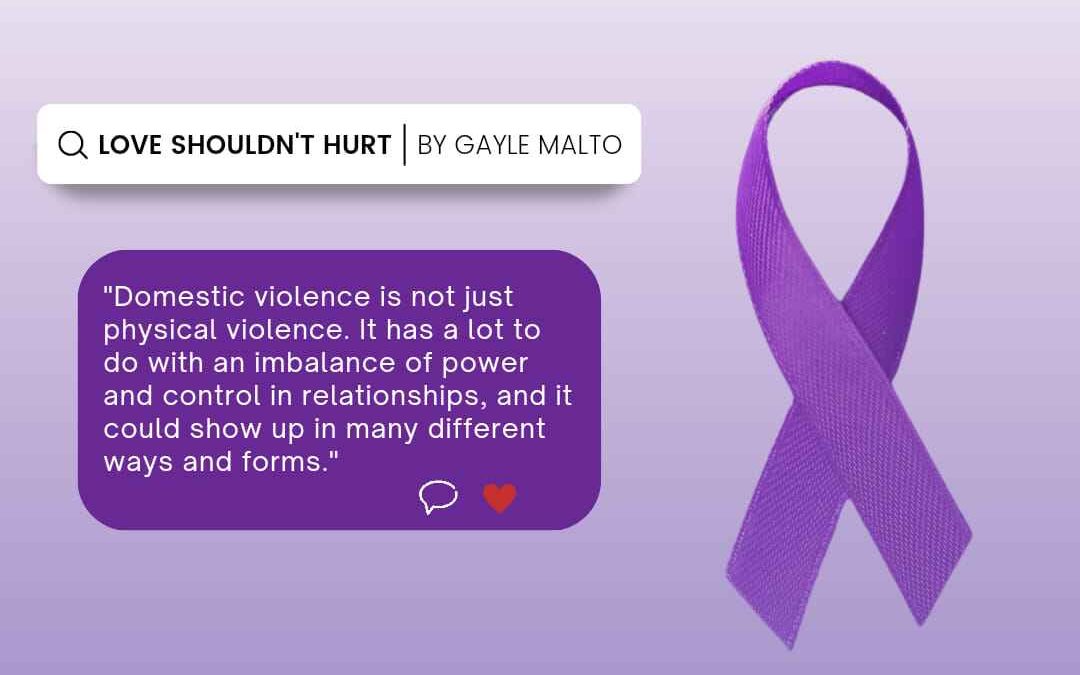Letting go is not a lot of people’s strong suit. Regardless of how painful, toxic, and sacrificial it gets, some of us make it a promise to never let go, no matter what. We witnessed generations of women, particularly wives, put up with their abusive and manipulative husbands, using “love” as an excuse not to pack their bags and leave. We all know the story. They were high school sweethearts who fell madly in love and got married really young. It was almost a fairytale ending until reality hit them—he became an alcoholic and a wife-beater. The deadly combo. But no matter how horrible he became, she stayed. Why?
Because she loved him, and he loved her. She then lives on to tell the story to her children and, eventually, her grandchildren. But instead of telling it exactly how it was, she sugarcoats and romanticizes it until it becomes just another tale with a happily ever after, and the cycle of skewed ideas of love continues for generations to come.
This valentine’s day, some of us may receive teddy bears and chocolates or gifts along with “I love you’s” from our romantic partners to commemorate the special day. But before you declare that person your true valentine, you should ask yourself the following questions first to determine if you’re in an unhealthy or abusive relationship.
1. ARE THEY PHYSICALLY ABUSIVE?
Although for some of us, this is painstakingly obvious, for others, it is not. Physical abuse may come in many different forms and be justified for many different reasons. If your partner is causing you any physical harm, regardless of size, frequency, or reason, it is highly possible that you are a victim of domestic violence and require immediate help and intervention.
2. DO THEY USE SELF-HARMING AS A THREAT?
Couples fight. It is pretty common for relationships to have conflicts. But when your partner uses self-harm as a threat to get what they want, to win an argument, to pressure you to do something, or to avoid a breakup, that is when the relationship becomes lethal. Recognizing that does not automatically dismiss their suffering from poor mental health, as some people genuinely have inner battles while in a relationship. However, when they use their condition to manipulate and get rid of your freedom to choose whether or not you want to remain in a relationship, that is when the situation becomes problematic.
3. DO THEY COERCE YOU TO HAVE INTIMATE RELATIONS?
Sexual coercion is often, but not to be mistaken for, sexual assault. Sexual coercion is when an individual uses pressure, tricks, or threats to get another to engage in unwanted sexual activity without using physical force, and it is usually between people in pre-established relationships. In sexual coercion, there is an apparent absence of physical force and a heavy emphasis on pressure. If your partner insists or threatens you to go faster than you’re ready for, invading your boundaries and disregarding your right to a choice in the process, then your partner does not see you as a person but as property—theirs to be taken and controlled as they see fit. Beware.
4. ARE THEY CONSTANTLY ACCUSING YOU OF CHEATING?
Understandably enough, some of us have valid reasons to fear getting cheated on. But when that fear turns into possessiveness and an excessive need for control, that fear becomes abusive. If your partner is constantly accusing you of cheating and consistently looking for ways to accuse you of cheating even when you have never thought of or committed such an act, it may be a sign that they are toxic, controlling, and incapable of trusting someone, which could then lead to abuse.
5. DO YOU CONSTANTLY NEED THEIR PERMISSION TO DO ANYTHING?
Most of us have seen those viral “funny” videos where the girlfriend refuses to let her boyfriend go out and have fun with his friends, or where the boyfriend refuses to let her girlfriend go out wearing a tight-fitting dress. Many people find those videos amusing and characterize that kind of behavior as “protective.” However, there is a very thin line between caring and controlling. People who care for you will voice their opinion, not force it. They will let you know what they think and how they feel about your decisions while still showing respect and honor for your autonomy.
6. DO THEY MAKE YOU QUESTION YOUR WORTH?
A partner should be one who uplifts you and cheers you on when you are feeling down; the one who encourages you to accomplish your goals and makes it known that they believe in you and what you can achieve. If your partner ceaselessly degrades you and makes you feel worthless and difficult to love, they are not worth considering as your lover, let alone a partner.
7. DO THEY SAY HURTFUL THINGS TO YOU WHEN YOU DISAGREE WITH THEM?
Humans commit errors. It has been long established that we, as human beings, are not perfect. When people get mad, it’s understandable that we, in the heat of the moment, say things we do not intend to say and end up hurting others. Some tend to be more lenient when their partners react negatively and explosively during a fight, taking into consideration their partner’s emotional well-being and their default response to conflict. It might be difficult to judge when to draw the line when leniency is given a little too frequently, so here is a little heads-up. When they attack you personally for something that doesn’t precisely concern you as a person and say things such as “I hate you” or “You mean nothing to me” then proceed to retract it once they get their way, already suggesting that they are a walking red flag.
8. DO THEY USE YOUR INSECURITIES TO ATTACK YOU DURING A FIGHT?
There are certain insecurities that we share with our loved ones in confidence, knowing that they will help and make us feel better about it. If you trusted your partner enough to tell them that you were insecure about your body, for example, and they went ahead and brought it up during a fight to attack you, adding salt to your wound, then that seems like your partner did not actually see your insecurities as something that makes you human but rather something that makes you a lesser human, less worthy of love and respect.
9. DO THEY GASLIGHT YOU?
What’s more frustrating than wholeheartedly expressing your feelings and having someone dismiss or invalidate them? We all want people who have done us wrong to acknowledge their mistakes and change for the better. It is unfulfilling when they forget to do the other, or worse, forget to do both. Most times, when they fail to do as they have promised, it comes with the “I’m not wrong, you’re just crazy” narrative. And when you hear it from the voices of master manipulators, it sounds like the truth, so you believe it and repeat to yourself that you are just being crazy, even when you are not. It might not be such a big red flag to others because this “sign” is heavily dependent on context, but if your partner does this a little too often, sooner or later, you will realize that they have a massive ego and will do anything to keep their hands clean. Who wants a partner like that?
10. DO YOU FEEL LIKE YOU CONSTANTLY HAVE TO HIDE?
Love should feel like an open field, not a closed cell. If you feel as though you have to hide things from your partner, especially things that make you happy, such as innocently hanging out with friends or meeting new people, because the way they react scares you, it might be a sign that you have a very controlling and potentially abusive partner. It never ends well when one person in the relationship is walking on eggshells around the other person, especially when it is because they fear for their safety or, worse, their lives.
Now, if you answered “yes” to any of these questions, you might want to reevaluate your relationship and reach out to your most trusted friends, family, or professionals for help and support.
Domestic violence is not just physical violence. It has a lot to do with an imbalance of power and control in relationships, and it could show up in many different ways and forms. This makes it quite challenging to spot for people who describe themselves as “madly in love” and people who grew up in conservative Filipino families who think that spousal abuse should always be tolerated and endured even when it puts one’s life and health at risk since to them domestic violence is simply a “marital problem” and should be kept on the low at all costs. It is crucial for people who are in relationships or are open to relationships to know that there is no excuse for abuse. Childhood trauma, depression, and other frustrations are never excuses for baleful behavior. It may be the reason for it, but never the excuse.
Depressing is an underwhelming term to describe the feeling of finding out that the person you love is someone whom you cannot trust, but it is a realization that you must be grateful for and a feeling you must accept. The poets might disagree, but no, love shouldn’t hurt.
–
If you or someone you know, regardless of gender, is experiencing domestic violence, you may contact the following advocates for help:
Gender Watch Against Violence and Exploitation (GWAVE)
https://www.facebook.com/GWAVEPhilippines/
(035) 422 84 05 | +63 915 259 3029 | +63 999 576 6679
ING MAKABABAYING AKSYON (IMA) Foundation
https://www.facebook.com/Ing-Makababaying-Aksyon-IMA-Foundation-131515322286/
(045) 323

